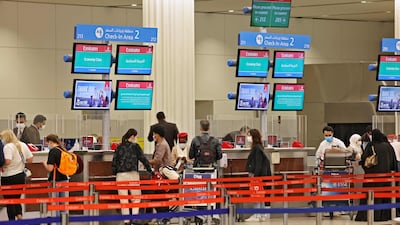Emirates airline has apologised to a disabled passenger who felt “humiliated” after abandoning her luggage in Dubai so she could carry life-saving oxygen equipment on board a flight to Pakistan.
Amna Raheel, who has muscular dystrophy, was flying from Dubai to Karachi when she was told she would have to pay extra to take her oxygen concentrator on board flight EK606 on August 9.
Her genetic condition causes muscles to gradually weaken over time, leading to an increasing level of disability.
Ms Raheel, a Pakistan citizen, also has a lung condition, chronic obstructive pulmonary disease.
She requires the oxygen when she gets out of breath, particularly at altitude, and regularly travels with the device.
Emirates has a policy allowing similar medical devices to be carried on board, if signed off by a medical practitioner in advance.
But on checking in her luggage at Dubai International Airport’s terminal three, ground staff said Ms Raheel would have to pay an excess baggage fee, as the weight of the equipment took her above her free allocation.
“I was told that I was overweight and my oxygen concentrator would be counted in my baggage allowance, which was highly absurd since I was carrying a medical certificate with me,” said Ms Raheel, who posted of her experience on social media.
“That would mean that if a person with disability is carrying a life-saving equipment with them, they are not allowed to carry any other form of luggage, including essential items like clothes, shoes or toiletries.
“If a wheelchair for disabled passengers is free of baggage allowance, then lifesaving medical equipment should be too.
“I am a frequent traveller and I have never in my 31 years of travel life faced such humiliation by airport staff.”
Despite presenting a medical letter from Dr Ali bin Sarwar Zubairi, a pulmonologist at the Aga Khan University Hospital in Karachi, check-in staff refused to accept the device as an essential piece of equipment and insisted she paid an excess baggage fee.
Ms Raheel, who runs her own wellness gift business, said she was forced to abandon her luggage at the airport and fly home to Pakistan just with her oxygen machine.
The airline has since apologised and said it would review its procedures.
Emirates apologises for incident
“Emirates would like to offer our sincere apologies for the distress and inconvenience caused to Ms Raheel,” an official said.
“We pride ourselves on our customer service and were disappointed to learn that our policies relating to the carriage of portable oxygen devices were misinterpreted by check-in staff, coupled with behaviour that did not reflect our values and service standards.
“We take this feedback seriously and are taking the necessary steps to ensure that incidents such as this do not happen again.
“Our customer affairs team is currently in contact with Ms Raheel.”
Assisted ventilation for people with Duchenne muscular dystrophy has become more common outside of hospital, as devices are now smaller and more portable.
The equipment used by Ms Raheel concentrates oxygen from a gas supply by removing nitrogen to supply an oxygen enriched flow of vapour that can be inhaled.
They are particularly useful for those with breathing difficulties or respiratory conditions such as asthma, and typically cost around Dh3,000 ($816) to Dh5,000.
Oxygen concentrators are also used by patients recovering from a long-term covid-19 infection that has left them with scarring on lung tissue, making it difficult to breathe.
Charity offers new machine
Faisal Jamil, chairman of the Humanitarian Association for National Development Support, in Pakistan's capital Islamabad, read of Ms Raheel’s experience and would like to donate a smaller, more portable device made by Philips for her to use in future.
“We have been using these devices with covid patients in Pakistan for more than two years now,” he said.
“Normally, some airlines do not allow people to fly with these [larger] kind of machines, so we have arranged for a brand-new, battery-operated oxygen concentrator for her to use in future.”


